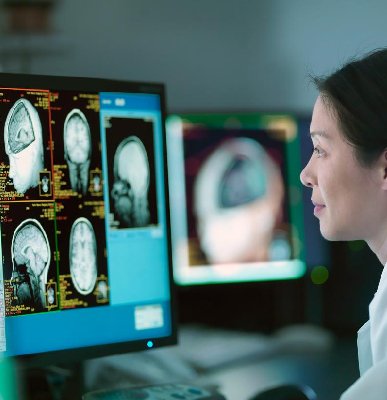
A Neurologist is a medical doctor specialized in diagnosing, treating, and managing disorders related to the nervous system, which includes the brain, spinal cord, nerves, and muscles. This field of medicine encompasses a wide range of conditions, from migraines and epilepsy to more complex diseases like Alzheimer’s, Parkinson’s, multiple sclerosis, and stroke recovery. Neurologists undergo extensive training to understand the intricate workings of the nervous system and its impact on the rest of the body. They use a variety of diagnostic tools, such as EEGs, MRIs, and CT scans, to accurately identify neurological disorders. Treatment plans may involve medication management, rehabilitation therapies, and sometimes referral for surgical intervention, depending on the condition. Neurologists also play a crucial role in ongoing research, seeking new treatments and understanding of neurological conditions.
Vihaan Hospital & Research Centre features a distinguished Neurology department, known for its cutting-edge diagnostic and treatment services for patients with neurological disorders. This department is staffed by a team of expert neurologists who specialize in managing a wide array of neurological conditions, including stroke, epilepsy, migraines, multiple sclerosis, Parkinson’s disease, and Alzheimer’s disease, among others. Utilizing state-of-the-art technology and evidence-based approaches, the neurology team offers comprehensive care that encompasses both inpatient and outpatient services. Their commitment to personalized patient care, combined with ongoing research and education, positions Vihaan Hospital as a leader in neurology, providing hope and advanced healthcare solutions for patients navigating the complexities of neurological diseases.
Neurologist F&Q's
A neurologist is a medical doctor specialized in diagnosing, treating, and managing disorders of the brain and nervous system, including the spinal cord, nerves, and muscles. This includes a wide range of conditions such as stroke, epilepsy, migraines, multiple sclerosis, Parkinson’s disease, and Alzheimer’s disease.
You should consider seeing a neurologist if you experience symptoms like persistent headaches, seizures, weakness, numbness, dizziness, memory problems, movement issues, or any symptoms suggesting a problem with the nervous system.
Neurologists use a variety of diagnostic tests to identify neurological disorders, including MRI and CT scans for detailed images of the brain and spinal cord, electroencephalograms (EEG) to measure electrical activity in the brain, and lumbar punctures to examine cerebrospinal fluid, among others.
The curability of neurological disorders varies widely depending on the specific condition. Some conditions, like certain types of epilepsy, can be effectively treated and controlled, while others, such as Parkinson’s disease, can be managed to improve symptoms but not cured. Treatment strategies often focus on managing symptoms and improving quality of life.
A neurologist specializes in the non-surgical treatment of neurological disorders, focusing on diagnosing and managing diseases of the nervous system. A neurosurgeon specializes in the surgical treatment of neurological conditions, performing operations on the brain, spinal cord, and nerves.
Lifestyle changes can significantly impact neurological health. Regular physical activity, a healthy diet, adequate sleep, stress management, and avoiding harmful substances can reduce the risk of developing neurological disorders, help manage symptoms of existing conditions, and improve overall brain health and function.











